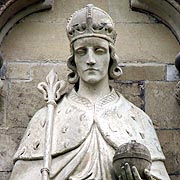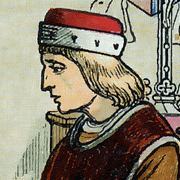Henry VI (1421-1471) - King of England 1422-1461 & 1470-1471
Henry VI was the only child of King Henry V and Katharine of Valois, born
on 6th December 1421 at Windsor Castle. He became King of England, upon his father's death, when he was only nine months old. The Council assumed the regency, but, as the King's eldest uncle, John, Duke of Bedford, was usually fighting in France, his younger uncle, Humphrey, Duke of Gloucester, was practically allowed to act as Protector. Two months after his accession to the English crown, Henry became, so far as the Treaty of Troyes could make him so, King of France also and he was the only English King ever crowned in France with that title. His uncles, Henry, Cardinal Beaufort, and Gloucester, above mentioned, both imbued him with a love of learning which remained his consolation during his long and miserable reign. His first tutor (1428-1436) in martial exercises was Richard Beauchamp, Earl of Warwick, who perhaps ill-treated him and gave him a disgust for such matters, for he seems to have been a tender and delicate boy. He spent his summers in residence with his mother at Wallingford Castle in Berkshire. Henry was crowned at Westminster in 1429 and at Paris in 1430.
With the appearance of Joan of Arc in 1429, however, the French possessions
began to slip from the English grasp and the disappointed Lancastrian princes thereupon began to quarrel among themselves at home. Henry was continually obliged to make peace between his uncles, and the death of the Duke of Bedford, the ablest and perhaps the best of them, in 1435, was a severe loss to his nephew. Beaufort and Gloucester were perpetually quarrelling and their quarrels disgusted the pious and unworldly boy who, at the age of eighteen, turned to the solid work of his life, the establishment of his great foundations for learning at Eton and Cambridge. These he pursued with a resoluteness, an attention and an insight which are worthy of all praise and which entirely dispose of all stories to the effect that he was of weak intellect. The only other matter in which the King showed any interest was the possibility of a peace with France, and this, which really redounded so much to his honour, was the very thing that made his contemporaries despise him. A marriage with a French princess (several were suggested) would probably form an important part of any treaty and, at last, Henry obtained a step towards such a treaty by consenting to marry Margaret of Anjou in 1445. The French King, Charles VII, who was rapidly reconquering his northern provinces, took no notice of the match, but was not ill pleased at it. Soon after its arrangement, he concluded a truce for two years. But every disappointed English plunderer of France, noble and yeoman alike, exclaimed against it and against Henry's friend, the Duke of Suffolk, who had arranged it. Margaret was hated as an 'outlandish woman', whose marriage had been bought with surrenders; and her stern and vindictive character did nothing to conciliate opposition. For gentle Henry, she was no fit mate and the French peace, when it at last came (1453), was merely the prelude to civil war in England.
Gloucester, from the first, voiced the popular cry for a continuance of the War
at all costs, and when he died in February 1447, Beaufort, Suffolk, Margaret and even Henry himself were freely accused of murdering him. Beaufort followed Gloucester to the grave a few weeks later. Normandy was rapidly lost in 1449. Suffolk was, in consequence, impeached in Parliament and, though never convicted, was murdered by Henry's enemies. A popular insurrection, in the following year, shook the throne badly and, in 1450, Henry's great rival, Richard, Duke of York, great-grandson of King Edward III, appeared upon the scene. At what date York determined to play for his own hand is uncertain. Perhaps he was mainly a tool of the ambitious and discontented nobles. At first, he professed merely a desire to exclude 'evil counsellors' — chiefly the Beaufort family — from the King's presence. Henry would probably have submitted to this or to anything but for his ambitious wife. But Margaret could act with vigour. Now she would pack a Parliament which would attaint York and his partisans. Now she would call, and not in vain, on her supporters to take the field in arms. The final loss, in 1453, of Guienne, the last of England's French possessions except Calais, did not mend matters. The country was full of disbanded soldiers and ripe for the civil war which soon ensued.
Twice during the decade 1450-60, Henry was overcome by a grievous illness both
of mind and body (July 1453-January 1454; October 1455-February 1456). During the former of these illnesses, his only child, Prince Edward of Lancaster, was born and, during each of them, York acted as Protector. In one of the early battles (St. Albans), in May 1455, the gentle King was wounded in the neck by an arrow. At last, in 1460, York formally claimed the throne. Though he agreed to allow Henry to retain for life the title of King, the young Lancastrian Prince of Wales was to be excluded. Margaret would never tolerate this for a moment and would fight to the last, but, upon York's death at Wakefield, his soldier son acted with vigour, seized the throne as King Edward IV and drove Henry and Margaret northwards, defeating their troops at Towton. Henry was thenceforth for three years, 1461-4, a wanderer on the Scottish border or a dependant on the charity of the Scottish King. When, in 1464, his partisans in the north of England again rose for him and were speedily defeated, he lurked in disguise in various old houses in Lancashire or Westmoreland and was finally captured in Ribblesdale in 1465. He was brought to London a prisoner in bonds and was hooted by the mob. He was sent to the Tower, where he remained a prisoner for five years. Various stories are told of his treatment, which under such a man as Edward IV is not likely to have been good; but friend and foe alike agree as to his patience and gentleness in suffering. When the Yorkists, in their turn, began to quarrel among themselves and the Earl of Warwick drove out Edward IV, in October 1470, Henry was again taken from the Tower and treated as King.
It was a very brief 'Restoration' and, after the defeats of Warwick and Margaret
by the returned Edward at Barnet and Tewkesbury, Henry was murdered in the Tower, on 21st May 1471. Tradition has always pointed to Richard, Duke of Gloucester, afterwards King Richard III, as the actual murderer and history has done little to upset this tradition. Henry was buried at Chertsey Abbey until his murderer sought to conciliate public opinion by removing his body to St. George's Chapel in Windsor. Popular affection, in the North especially, had already canonized the deceased King. Miracles were reported of him. Hymns and prayers addressed to him still exist. Henry VII, seeing what a valuable addition to Lancastrian power it would be to have his predecessor regularly enrolled as a saint, took soundings at Rome on the subject; but canonization was an expensive process in the Rome of the Renaissance, and Henry VII was too fond of money to carry it through.
Few characters have, however, so profoundly left their mark upon English
imagination and it is to the credit of Englishmen that they could worship the purity, the meekness and the devotion of the 'murdered saint', as well as the force and virility of the 'majestic Lord who broke the bonds of Rome'. If Henry VI was wholly out of touch with his own age, it was perhaps because some divine insight, the result of his saintly life, enabled him to see through the bloodshed and sordid horrors of the immediate future, and to devote his energies to the provision of education for generations of Englishmen yet to come.
Edited from CRL Fletcher's 'Historical Portraits' (1909)
|



No comments:
Post a Comment